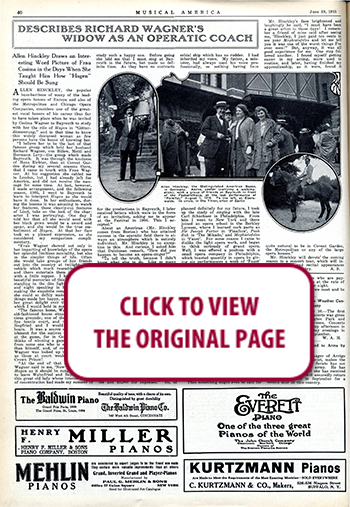 100 YEARS AGO...IN MUSICAL AMERICA (100)
100 YEARS AGO...IN MUSICAL AMERICA (100)
June 19, 1915
Page 40
DESCRIBES RICHARD WAGNER’S WIDOW AS AN OPERATIC COACH
Allen Hinckley Draws an Interesting Word Picture of Frau Cosima in the Days When She Taught Him How “Hagen” Should Be Sung
ALLEN HINCKLEY, the popular bass-baritone of many of the leading opera houses of Europe and also of the Metropolitan and Chicago Opera Companies, considers one of the greatest vocal honors of his career thus far to have taken place when he was invited by Cosima Wagner to Bayreuth to study with her the role of Hagen in “Götterdämmerung,” and in that time to know this widely discussed woman as few persons have the honor of knowing her.
"I believe her to be the last of that famous group which held her husband Richard Wagner, von Bülow, Mottl and Hermann Levy—the group which made Bayreuth. It was through the kindness of Hans Richter, then at Covent Garden during my several seasons there, that I came in touch with Frau Wagner. At his suggestion she cabled me to London, but I had already left for America, and did not receive the message for some time. At last, however, I made arrangement, and the following season, 1905, I went to Bayreuth to learn to interpret Hagen as she would have it done. In her enthusiasm, during the lessons it was amusing to watch her features, those clearly-cut features of Liszt, take on the look of the character I was portraying. One day I told her that all she would need with her black gown would be a sword and spear, and she would be the true embodiment of Hagen. At that her face took on a pleased expression, as she considered my comparison complimentary.
“Frau Wagner showed not only in her imparting of knowledge of the opera her splendid limitless mentality, but also in the simpler things of life. Often she would take groups of her friends out into the country at twilight, in a vehicle which much resembled a ‘bus, and there entertain them in the open with a little supper. I have the most beautiful memories of this great woman, standing in the dim light between day and night speaking in her soft voice, making the exquisite comparisons which she could so deftly make. Such small things made her happy, and I remember her great delight over the glow-worms which I would hold in my hand for her.
“The famous home, Wahnfried, is an old-fashioned house situated amid spacious grounds; one of the luxuries is a fine tennis court, and there her son, Siegfried and I would spend many hours. It was a source of great astonishment for the natives to see me win at the game, for in Germany no one thinks of winning a game of any kind from someone who is of higher rank than himself, and, of course, Siegfried Wagner was looked up to at Bayreuth as those at court would look to the Crown Prince!
“At the end of that Summer Frau Wagner said to me, ‘Now you may sing Hagen as it should be sung,’ and I had to leave Wahnfried and Bayreuth, and this great old lady whose intense powers of concentration had made my summer of study such a happy one. Before going she told me that I must sing at Bayreuth in the future, but made no definite time. As they have no contracts for the productions in Bayreuth, I later received letters which were in the form of an invitation, asking me to appear at the Festival in 1906. This I accepted.”
About an American (Mr. Hinckley comes from Boston) who has attained success in the operatic field there is always an atmosphere which is entirely individual. Mr. Hinckley is no exception to this. And curious, I asked him that Dulcinean remark, “How did you happen to become an opera-singer?”
“To tell the truth, because I didn’t know what else to do. Like so many other young American men, upon leaving college I much resembled the proverbial ship which has no rudder. I had inherited my voice. My father, a minister, had always used his voice professionally, so nothing having been planned definitely for my future, I took up the study of singing with the late Carl Schachner in Philadelphia. From him I went to New York and there joined an opera school in the Berkley Lyceum, where I learned such parts as Sir Joseph Porter in ‘Pinafore,’ Pooh Bah in ‘The Mikado,’ and Mephistofeles in ‘Faust.’ For some reason I came to dislike the light opera work, and began to think seriously of grand opera. Well, I was offered a position with a small opera company in Philadelphia, which boasted quantity in opera by giving six performances a week of ‘Faust’ and receiving for some ten, twenty and thirty cents a seat!"
Mr. Hinckley’s face brightened and laughingly he said, “I must have been a great artist in those days! I remember a friend of mine said after seeing me, ‘Hinckley, I just paid ten cents to see your Mephistofeles and let me tell you it was one of the worst things I’ve ever seen!” But, anyway, it was all good experience for me. One step followed another. I found myself getting easier in my acting, more used to routine, and later, having finished my apprenticeship, as it were, found it quite natural to be in Covent Garden, the Metropolitan or any of the large opera houses.”
Mr. Hinckley will devote the coming season to a concert tour, which will include oratorio and recital appearances throughout the country. —A. S.




 RENT A PHOTO
RENT A PHOTO





